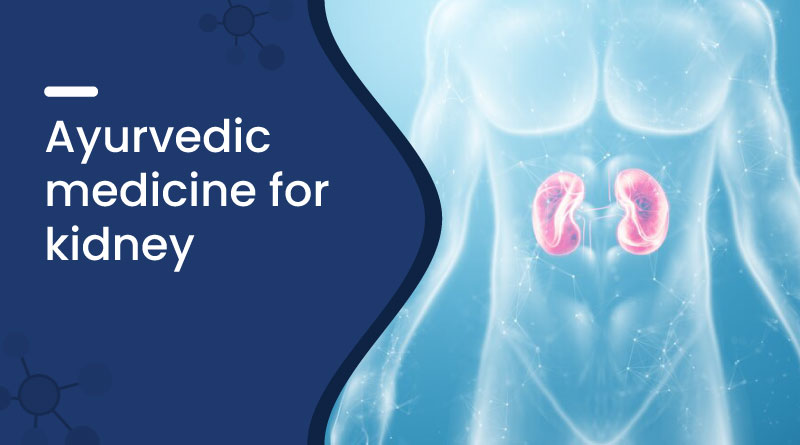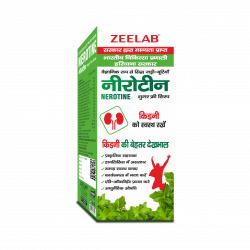Ayurvedic Medicine for Kidney Problem


In Ayurveda, kidney disease is linked with “Mutravaha Srotas Vikara,” a urinary system problem. Kidneys play an essential role in removing waste from the blood. Imbalance of vata and kapha doshas is associated with kidney disease. In this guide, we’ll explore how Ayurveda can help manage kidney disease with herbal medicines, dietary adjustments, and lifestyle changes.
Causes of Kidney Disease
- Dosha Imbalance: Issues with Vata, Pitta, or Kapha affecting the kidneys.
- Ama Accumulation: Toxins build up from poor digestion.
- Improper Diet: Too much salty, spicy, oily, or processed food harms kidney health.
- Lack of Hydration: Not drinking enough water affects urine and toxin removal.
- Suppression of Natural Urges: Holding in urine or bowel movements harms kidney function.
- Chronic Stress: Mental stress weakens kidney performance.
- Excessive Alcohol & Smoking: Increases toxins and weakens kidney tissues.
- Sedentary Lifestyle: Results in poor metabolism and toxin accumulation.
Symptoms of Kidney Disease
- Tired and weak.
- Swelling (edema) in legs, ankles, feet, or face.
- Changes in urination: frequent at night or reduced output.
- Foamy or bloody urine indicates protein or blood leakage.
- Shortness of breath from fluid in the lungs.
- Loss of appetite with nausea or vomiting.
- Muscle cramps, especially in the legs.
- Itchy or dry skin from mineral imbalance or toxins.
- Concentration issues and mental fog.
- Persistent puffiness around the eyes, an early sign of protein loss.
Types of Ayurvedic Medicines for Kidney Disease
Ayurveda offers a variety of herbal remedies that can help in the treatment and prevention of kidney disease. Ayurvedic medicines for kidney disease help restore balance in the body by addressing the doshas (Vata, Pitta, and Kapha). These natural remedies enhance kidney function, increase urine output, reduce inflammation, and aid in repairing damaged tissues. They also improve digestion and metabolism, contributing to overall health and inhibiting further kidney issues.
List of Ayurvedic Medicine Name for Kidney Disease
- Punarnava: Helps with fluid retention and detoxification.
- Varun: Treats kidney stones, urinary infections, and improves urine flow.
- Gokshura: Acts as a diuretic and boosts kidney function.
- Palash: Cleanses the kidneys and manages urinary issues.
- Kaasni: Aids liver and kidney function by removing toxins.
- Chandraprabha Vati: Promotes kidney health and reduces inflammation.
- Neem: Helps fight infections.
- Turmeric: Protective, anti-inflammatory, and antioxidant effects.
- Guduchi: Enhances immunity and reduces stress on the kidneys.
Best Ayurvedic Medicines for Kidney Disease
- NatureXprt Pathri Thor Syrup: Breaks kidney stones, removes toxins, reduces inflammation, pain, burning, and prevents urinary tract infection.
- Nerotine Kidney Syrup: Eliminates toxins, decreases inflammation, inhibits kidney stones and urinary infections, and improves overall kidney function.
How Ayurvedic Medicines Work for Kidney Disease
- Dosha Balance: Ayurvedic treatment aims to balance the three doshas (Vata, Pitta, Kapha), which are considered fundamental to kidney health.
- Detoxification (Panchakarma): Techniques such as Virechana and Basti are utilized to eliminate toxins (Ama) from the body and kidneys, enhancing their function.
- Support Diuresis: Medicines such as Punarnava and Gokshura improve urine flow and support waste elimination.
- Anti-inflammatory Action: Various Ayurvedic herbs possess properties that reduce inflammation in kidney tissues and the urinary tract.
- Rejuvenation (Rasayana Therapy): This therapy focuses on strengthening kidney cells and facilitating tissue repair and regeneration.
- Improved Digestion and Metabolism: Herbs that enhance Agni (digestive fire) are crucial in preventing toxin accumulation that can adversely affect kidney function.
- Blood Pressure Control: Ayurvedic herbs, such as Arjuna, are beneficial in managing hypertension, which is a significant contributor to the progression of kidney disease.
- Prevent Protein Loss: Formulations like Chandraprabha Vati are designed to minimize protein loss in the urine (proteinuria).
- Preventing Kidney Stone Formation: Specific Ayurvedic formulations are effective in dissolving or preventing kidney stones, thereby reducing stress on the kidneys.
Dietary Recommendations for Kidney Disease
Foods to Eat
- Low-potassium fruits: Apples, berries, grapes, pineapple.
- Low-potassium vegetables: Cabbage, cauliflower, bell peppers, green beans.
- White rice: Low in phosphorus and potassium.
- Egg whites: High-quality protein, low in phosphorus.
- Fish: Omega-3, and protein source.
- Olive oil: A healthy fat source, kidney-friendly.
- Herbs & spices: Flavor enhancers without sodium.
- Unsalted popcorn/rice cakes: Low-sodium snack options.
Foods to Avoid
- High-sodium foods: Processed foods, salty snacks, pickles, canned soups.
- High-potassium foods: Bananas, oranges, potatoes, tomatoes, spinach.
- High-phosphorus foods: Dairy products, nuts, seeds, cola drinks.
- Red meat and organ meats: High in protein, and waste buildup.
- Packed food: Contains unhealthy fats and preservatives.
- Dairy in excess: Increases phosphorus and potassium levels.
- Dark-colored sodas: Contain phosphorus additives.
- Processed meats: Sausages, ham, and bacon are high in sodium and preservatives.
Lifestyle Tips for Managing Kidney Disease
- Eat a kidney-friendly diet: Choose low-sodium, low-potassium, and low-phosphorus foods.
- Limit protein intake: Eat moderate amounts of protein to reduce kidney strain.
- Exercise regularly: Aim for light physical activity like walking or yoga.
- Control blood sugar: Manage diabetes with a proper diet and medication.
- Avoid smoking and alcohol: Both can damage the kidneys further.
- Take medications as prescribed: Follow the dosage and never skip kidney medications.
- Stress management: Yoga and meditation.
- Get regular checkups: Keep up with lab tests and doctor visits.
Benefits of Ayurvedic Medicine for Kidney Disease
- Natural Healing: Uses herbs and plant-based remedies to support kidney function.
- Boost Digestion: Improves metabolism and reduces toxin buildup (Ama).
- Improves Urine Flow: Increases urine flow and eliminates toxins.
- Reduces Inflammation: Eases swelling in the kidneys and urinary tract.
- Balances Doshas: Restores body balance according to Ayurvedic principles.
- Improves Immunity: Boosts overall resistance to infections.
- Reduce Side Effects: Generally safe with fewer side effects than synthetic drugs.
- Manages Symptoms: Helps control symptoms like fatigue, swelling, and high blood pressure.
Conclusion
Ayurvedic medicine for kidney disease focuses on natural herbs and lifestyle changes to support kidney function and reduce symptoms. While it may help manage the condition and improve overall health, it is not a guaranteed cure. Combining Ayurveda with modern care can enhance results and prevent complications.
Frequently Asked Questions
Q: Can Ayurveda cure kidney disease completely?
A: Ayurveda may help manage kidney disease and slow its progress, but a complete cure depends on the stage and severity. It works best in the early stages.
Q: How long does it take for Ayurvedic medicine to work?
A: It may take a few weeks to a few months to see improvement, as Ayurveda works slowly by healing the root cause.
Q: Are there any side effects of Ayurvedic medicines?
A: Generally safe if taken as prescribed by a qualified Ayurvedic doctor, but self-medication or poor-quality herbs may cause side effects.
Q: Can I take Ayurvedic medicine with allopathic treatments?
A: Yes, but always consult both your Ayurvedic and allopathic doctors to avoid drug interactions.
Q: How can I prevent kidney disease from recurring?
A: Maintain a healthy diet, stay hydrated, control blood pressure and sugar, avoid painkillers and alcohol, and follow your doctor’s advice regularly.
Aparmarg (40 mg) + Punarnava (30 mg) + Gokhru (55 mg) + Kusha (40 mg) + Kash (45 mg) + Pasana Bhed (80 mg) + Varuna (60 mg) + Kulath (20 mg) + Manjishta (60 mg) + Ajwain (10 mg) + Mulaka (30 mg)
225ml in 1 bottle
Punarnava (80 mg) + Makoi (75 mg) + Kasni (35 mg) + Gorakhmundi (55 mg) + Giloy (45 mg) + Varun (70 mg) + Chopchini (40 mg) + Gojihva (45 mg) + Kankol (30 mg) + Usheer (60 mg) + Haridra (45 mg) + Gokshru (60 mg) + Aspartame (7 mg) + Sodium Methylparaben (0.2%) + Sodium Propylparaben (0.025%) + Citric Acid (0.1%)
200ml Syrup in 1 bottle
Recent Blogs
Disclaimer : Zeelab Pharmacy provides health information for knowledge only. Do not self-medicate. Always consult a qualified doctor before starting, stopping, or changing any medicine or treatment.


















 Added!
Added!